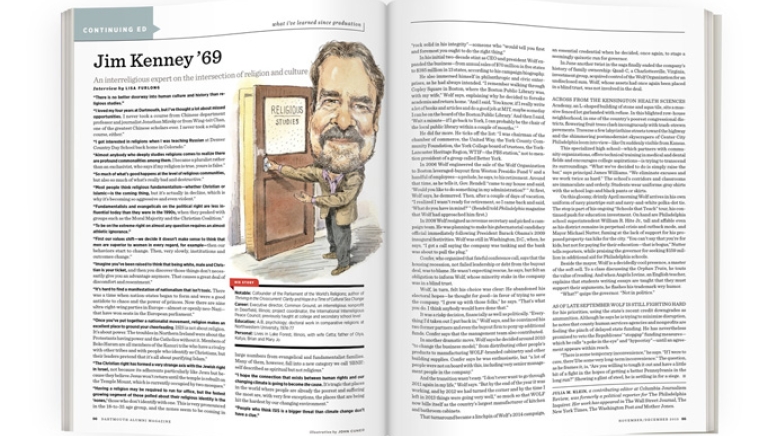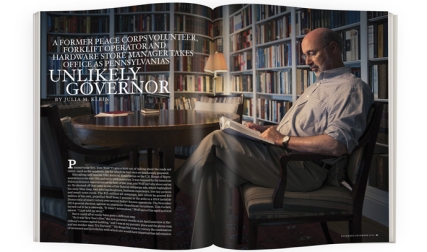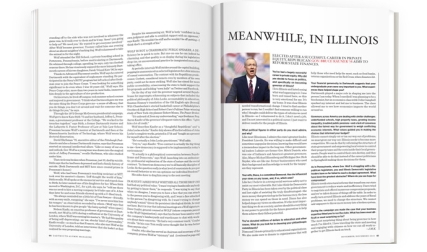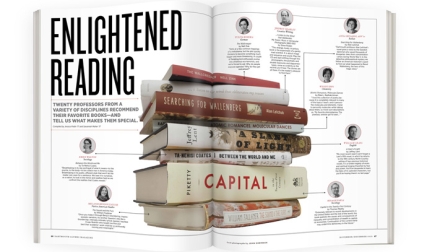Notable: Cofounder of the Parliament of the World’s Religions; author of Thriving in the Crosscurrent: Clarity and Hope in a Time of Cultural Sea Change
Career: Executive director, Common Ground, an interreligious nonprofit in Deerfield, Illinois; project coordinator, the International Interreligious Peace Council; previously taught at college and secondary school level
Education: A.B, psychology; doctoral work in comparative religions at Northwestern University, 1974-77
Personal: Lives in Lake Forest, Illinois, with wife Cetta; father of Olya, Katya, Brian and Mary Jo
“There is no better doorway into human culture and history than religious studies.”
“I loved my four years at Dartmouth, but I’ve thought a lot about missed opportunities. I never took a course from Chinese department professor and journalist Jonathan Mirsky or from Wing-tsit Chan, one of the greatest Chinese scholars ever. I never took a religion course, either.”
“I got interested in religions when I was teaching Russian at Denver Country Day School back home in Colorado.”
“Almost anybody who deeply studies religions comes to realize there are profound commonalities among them. I became a pluralist rather than an exclusivist, who says if my religion is true, yours is false.”
“So much of what’s good happens at the level of religious communities, but also so much of what’s really bad and destructive.”
“Most people think religious fundamentalism—whether Christian or Islamic—is the coming thing, but it’s actually in decline, which is why it’s becoming so aggressive and even violent.”
“Fundamentalists and evangelicals on the political right are less influential today than they were in the 1990s, when they peaked with groups such as the Moral Majority and the Christian Coalition.”
“To be on the extreme right on almost any question requires an almost athletic ignorance.”
“First our values shift—we decide it doesn’t make sense to think that men are superior to women in every regard, for example—then our behaviors start to change. Then, very slowly, institutions and outcomes change.”
“Imagine you’ve been raised to think that being white, male and Christian is your ticket, and then you discover those things don’t necessarily give you an advantage anymore. That causes a great deal of discomfort and resentment.”
“It’s hard to find a manifestation of nationalism that isn’t toxic. There was a time when nation-states began to form and were a good antidote to chaos and the power of princes. Now there are nine ultra-right-wing parties in Europe—almost or openly neo-Nazi—that have won seats in the European parliament.”
“Once you’ve put together a nationalist movement, religion makes an excellent place to ground your cheerleading. ISIS is not about religion. It’s about power. The troubles in Northern Ireland were about the Protestants having power and the Catholics without it. Members of Boko Haram are all members of the Kanuri tribe who have a rivalry with other tribes and with people who identify as Christians, but their leaders pretend that it’s all about purifying Islam.”
“The Christian right has formed a very strange axis with the Jewish right in Israel, not because its adherents particularly like Jews but because they believe Jesus won’t return until the temple is rebuilt on the Temple Mount, which is currently occupied by two mosques.”
“Having a religion may be required to run for office, but the fastest growing segment of those polled about their religious identity is the ‘nones,’ those who don’t identify with one. This is very pronounced in the 18-to-35 age group, and the nones seem to be coming in large numbers from evangelical and fundamentalist families. Many of them, however, fall into a new category we call ‘SBNR’: self described as spiritual but not religious.”
“I hope the connection that exists between human rights and our changing climate is going to become the cause. It’s tragic that places in the world where people are already the poorest and suffering the most are, with very few exceptions, the places that are being hit the hardest by our changing environment.”
“People who think ISIS is a bigger threat than climate change don’t have a clue.”




